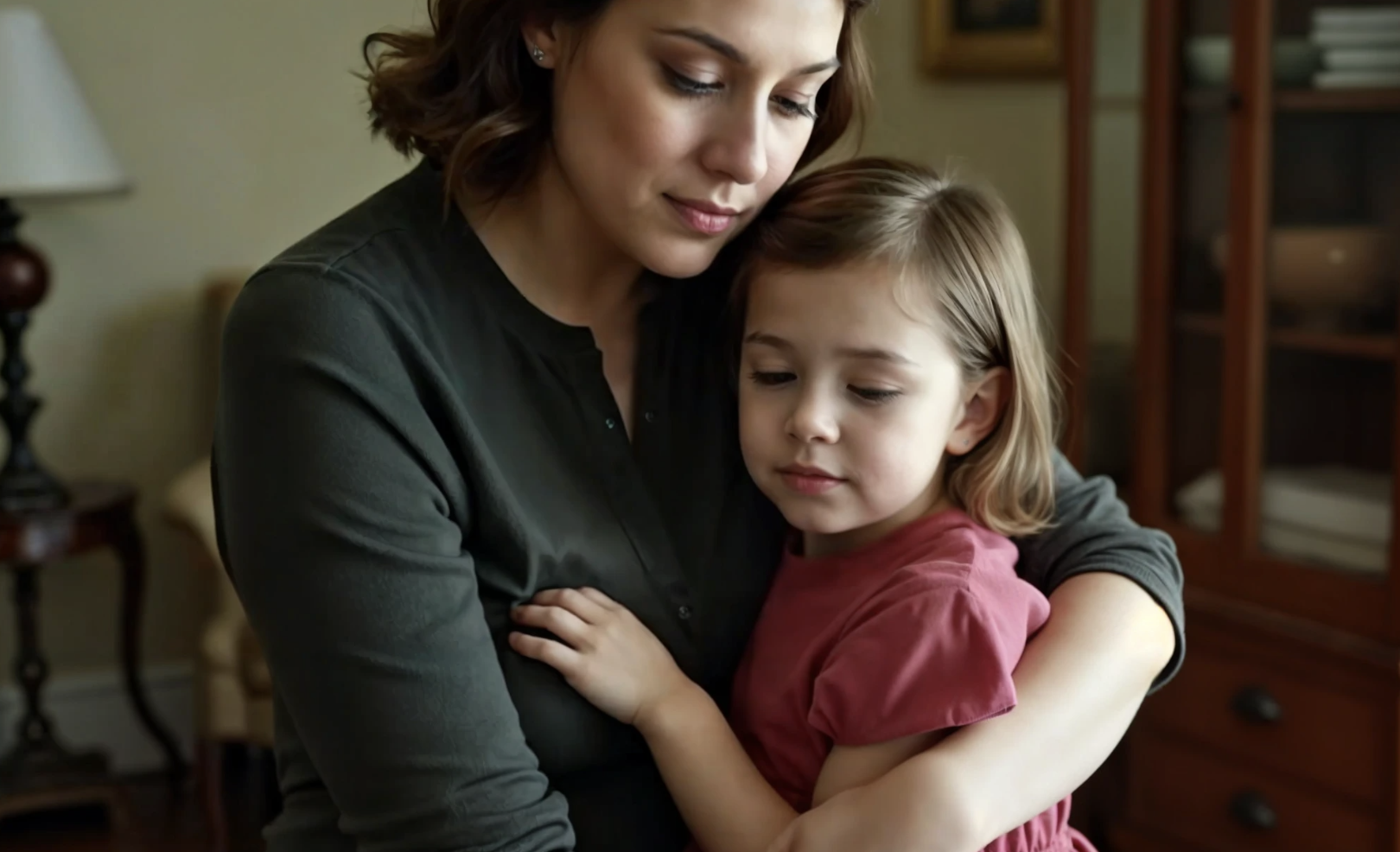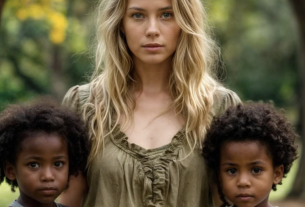Anna would never forget that spring day. Her friends had gathered at her modest apartment on the outskirts of Zarechnyy, preparing for the upcoming wedding. The air was filled with enticing aromas: juicy apple pies baked by her mother and fragrant lilacs brought by Tatyana. Outside, birds were singing, and the warm May breeze, slipping through the open window, playfully danced with the light curtains.
“His genes definitely aren’t the best!” her friends exclaimed, trying to dissuade the lovestruck bride-to-be. “We can see how he handles alcohol. Just think about his father! Remember how the elder Kravtsov used to cause a ruckus at the factory gate?” Yet, Anna merely stirred her tea with lemon absentmindedly, dismissing their words. For the twenty-year-old girl who had lost her head in love, such warnings sounded absurd. To her, Viktor was the ideal: handsome, confident, strong. At twenty-five, he already held the position of foreman at a machinery plant—where his father had once started as a simple mechanic. The occasional scent of alcohol on him she chalked up to youth and his circle of friends. “It’ll grow out of it,” Anna thought, recalling how romantically Viktor had courted her, showering her with roses and cruising around the city in his old Moskvich.
“Anya, dear,” her close friend Marina had said, “you saw his behavior on New Year’s Eve. He completely changes when he drinks. Remember how he nearly got into a fight with the guard, Petya?” But Anna remembered something entirely different—how Viktor had come the next day to apologize, kneeling in the courtyard with a huge bouquet of carnations, serenading her beneath her window, much to the delight of the neighborly grandmothers.
The wedding was magnificent—held at the city’s finest restaurant, with live music and fireworks illuminating the river. Viktor was sober and charming, dancing with his bride until they were both exhausted, and delivering beautiful toasts. Anna shone in a white dress, specially ordered from the regional center, while her friends whispered enviously about the happy couple. The first months of married life passed like a fairy tale. The new two-room apartment, purchased by Viktor’s parents, became their first shared nest. By then, the elder Kravtsov had become a shop floor manager and helped his son secure a home. Anna lovingly arranged the house—hanging curtains and decorating the window sills with flowers. Viktor would regularly return from work with gifts, whether it be candies or a new vase for her beloved chrysanthemums.
Their pregnancy came at the end of summer. They were returning from the country house, laden with baskets of apples and tomatoes, when that evening Anna felt an odd weakness and dizziness. Viktor attentively cared for her. He even bought a test himself, and upon seeing the two lines, he joyfully spun his wife around the room.
But the joy was short-lived. Just a week after that first burst of delight, everything began to change. For the first time, Viktor got so drunk that he lost consciousness. He shouted about being unready to become a father, that they were too young, that they should have waited. Anna cried for a long time, but then decided it was merely a fear of responsibility. The next morning, Viktor apologized, promised never to drink again, and swore to be a good father.
The pregnancy was difficult. Anna often found herself hospitalized for bed rest, while Viktor’s appearances at home became increasingly rare. When he did appear, he reeked of alcohol. Later he tried to mask his intoxication—speaking softly and moving cautiously—but his eyes betrayed his true state, clouded with red veins.
When Marina was born, Viktor didn’t even show up at the maternity ward. Later, Anna learned that he had spent three consecutive days drinking in a friend’s garage, celebrating the birth of their daughter. This marked the beginning of the end of their married life.
Five long years passed in a haze of endless quarrels. Little Marina grew into a smart and beautiful girl, yet her childhood was marred by constant conflict. Viktor’s drinking became more frequent, and money was squandered at the bar “Prichal” on the corner of Rechnaya Street. To make ends meet, Anna took a job as an accountant at a small firm. Her mother-in-law helped care for the granddaughter, and after her husband’s death from liver cirrhosis, Anna was too afraid to contradict her son.
“You must be drinking when I’m not around!” Viktor would bellow as he burst in late at night. “Where did you get the money for a new dress? Who are you having an affair with at work?” Anna remained silent—her dress had been bought by her mother. Talking to a drunken husband was futile; he wouldn’t believe a single word she said, suspecting her of infidelity, monitoring her every move, and causing scandals even at her workplace.
Marina was terrified of her father. At the sound of his footsteps on the stairs, she would either hide in a closet or run to the neighbor—Aunt Vale. The little girl became increasingly anxious, often crying at night, though she managed to excel at school as her escape from the turmoil at home.
That fateful autumn night, everything went awry from the very start. Late September was rainy, with a fine drizzle outside. Marina was turning six, and Anna had planned a small celebration for her daughter. A neighbor helped bake a “Ptichye Moloko” cake, balloons were hung throughout the room, and two of Marina’s kindergarten friends were invited. Viktor had promised to return sober—he had recently found a new job and was supposedly drinking less, giving hope for change.
However, he returned unusually early, around seven in the evening, already heavily intoxicated and reeking of cheap homemade liquor. Marina was just about to blow out the candles on her cake when her father burst into the room.
“What kind of party is it without me?” he exploded, overturning the table. The cake flew onto the floor, and the girls screamed as they scrambled into the hallway. Marina burst into tears.
“Why are you doing this?” Anna asked softly, trying to salvage the cake. “Today is her sixth birthday, after all…”
Viktor grabbed her by the hair.
“Shut up, you bastard! Who allowed you to boss around in my house?”
“Dad, stop!” Marina cried, trying to interpose herself between her parents as Viktor swung at her mother. He shoved Marina, and she hit a wardrobe, crying out in pain. That was the last straw. Anna grabbed a heavy crystal vase—a wedding gift from her colleagues—and struck her husband on the head.
Viktor collapsed like a felled tree. On the white carpet—a gift from his mother-in-law at the housewarming—a dark stain spread. Marina huddled in a corner, clutching her beloved stuffed bear tightly.
With trembling fingers, Anna dialed the police:
“Come… please come… I… I think I’ve killed my husband. Just take care of my little girl, please. She’s innocent.”
The trial was swift. Considering her state of emotional distress, her positive work record, and the fact that she had a minor, Anna received a sentence of ten years in a general regime prison.
Marina was taken in by her grandparents—Anna’s parents. They lived in a private house on the outskirts of the city, managing a small homestead. Grandfather Stepan worked as a carpenter, while Grandmother Klavdia tended the garden and raised her granddaughter.
Twenty years later, Marina sat in the cozy kitchen of her country home in the cottage settlement “Sosnovy Bor.” Her husband, Andrey—the director of the local machinery plant—was playing with their youngest son, teaching him how to assemble a radio-controlled car, while the two older children did their homework in the next room.
“Can you imagine,” Andrey said while tightening a motor with a screwdriver, “our Dimka assembled a radio all by himself today! He’s just like his grandfather. Remember how your grandfather Stepan always used to build things?”
Marina smiled as she looked at her happy family. She had met Andrey by chance at a class reunion. He had studied in a parallel class, graduated from a polytechnic institute, and begun his career as a junior engineer. A year after they met, they married—by then, Andrey had become the deputy head of the workshop.
She held no grudge against her mother, who had always defended them both. After serving ten years in prison, her mother was released but moved to another city to avoid reopening old wounds. They kept in touch by writing letters and congratulating each other on holidays, but they rarely met.
When Marina’s eldest son, fifteen-year-old Pavel, noticed that his father often clutched his side and winced in pain, she began to worry. Andrey brushed it off as ordinary fatigue, plenty of work at the plant, and a new contract with Chinese partners. But within a month, the truth emerged.
“Cancer, dear,” he admitted one evening when the children were already asleep. “But don’t tell the kids yet, okay? Especially not Dimka—he’s too sensitive.”
Andrey lived for another six months. He suffered greatly, yet continued to go to work as long as he could stand, played with the children, and made plans for the future. Marina was left alone with three children, but she didn’t break down. She found a job teaching piano at a music school—the education she had received in her youth proved invaluable. Grandmother Klavdia helped with the children, although she herself could barely move.
Then, Marina decided to learn to drive—having three children without a car was difficult, especially when the youngest, Dimka, started taking swimming lessons at a sports school on the opposite side of town.
At the “Svetofor” driving school, Marina was assigned to instructor Mikhail Yuryevich—a cheerful man in his fifties, with graying temples and lively brown eyes. He quickly built a rapport with his students, though he occasionally surprised them with unexpected gaps in his own knowledge.
“How is it that you haven’t read Lermontov?” Marina wondered after one lesson, as they discussed the recently adapted film “A Hero of Our Time.”
“Why?” Mikhail replied with a smile. “I’m more of a technical guy. I served in the tank corps in the army and worked as a long-haul truck driver for twenty years. And you are an excellent student—such a gentle start isn’t given to everyone!”
During one of the piano lessons, Marina noticed an unusual boy—Zhilya. His piano playing was so soulful, as if he were having a conversation with the instrument. It turned out he was Mikhail’s son.
“Let’s meet at a café to talk about Zhilya’s progress,” Mikhail suggested after the lesson. “He’s got quite a temperament—just like his mother.”
They went to “Poplavok,” a cozy little restaurant on the water built on an old barge. As the gentle rocking of the waves provided a backdrop, Mikhail shared his story. Many years ago, he had been hopelessly in love with a girl from an intellectual family. But her parents were categorically opposed to her marrying an ordinary driver. She married someone else. When Mikhail returned from the army two years later, he discovered he had a son—Zhilya, born to that very girl.
“Zhilya comes from the name Yulya,” Mikhail explained. “That unusual nickname stuck with him since childhood; now everyone calls him that. His mother died five years ago, and it’s just the two of us now.”
Fate’s quirks continued: once, during a driving lesson while practicing parking near the “Mechta” supermarket, Marina accidentally bumped into an elderly woman at a crosswalk. Fortunately, the woman escaped with nothing more than a fright—her groceries merely scattered across the asphalt. Mikhail insisted on taking the injured woman home… “Mom?” Marina could only whisper, recognizing her own mother in the elderly stranger.
They sat in a modest rented apartment, sipping tea with cookies, and her mother revealed everything. How she hadn’t been able to take her daughter after her release because her parents were against it, how she met the kind-hearted Ivan Petrovich—a bus depot mechanic who helped her start a new life—and how, after his death from a heart attack, she was left alone, taking on odd jobs wherever she could.
“Forgive me, my daughter,” her mother wept. “I thought of you every day. I watched your life from afar. Knowing you got married and had children… I was just too afraid to come near.”
Marina embraced her mother, forgiving the years of separation. In that moment, she realized there was no point in holding onto resentment—life was far too short.
A month later, Mikhail invited everyone to a family dinner. Zhilya played the piano—a gift his father had bought with earnings from long-haul trips—while the children listened with bated breath, and the grandmother discreetly wiped away tears.
Now they live together—a big, happy family. Mikhail and Marina married in the local church, quietly wed only among their own. The children call him “dad,” and Zhilya finally found siblings to call his own. Grandmother Klavdia moved in with them, helping with the household and taking care of the grandchildren. In the evenings, the whole family gathers in the spacious living room—some doing homework, others reading, and some playing the piano.
And no one ever talks about genes anymore—fate is determined not by them, but by love and forgiveness. Mikhail doesn’t drink even on holidays, though neighbors sometimes tease him about his mineral water. Prominently displayed in the living room hangs a large family photograph of them all—happy, smiling, and genuine.
Every Sunday, they visit Andrey’s grave. Marina has learned to live with this loss, though sometimes, seeing her eldest son so much like his father, she cannot hold back her tears. But Mikhail is always by her side—reliable, understanding, ready to support her at any moment.
Recently, Zhilya was admitted to a conservatory—he will study to become a pianist. At his first major concert at the philharmonic, the whole family gathered. And when the first chords of Chopin filled the air, Marina looked at her mother sitting beside her and realized: nothing in life happens by chance. Even the most terrible trials can lead to happiness if one keeps the ability to love.
Now, in the evenings, music often fills their large house. Zhilya is preparing for concerts, the younger children take lessons from him, and Mikhail, though not well-versed in classical music, listens to his children with pride. In these moments, Marina reflects on how strange fate can be—sometimes one must endure pain and loss to find true happiness.
And recently, Pavel, her eldest son, asked for permission to invite a girl over. Watching her love-struck son, Marina understood that the most important thing is to teach children to love and forgive. Only then can the cycle of pain and loneliness be broken, and only then can a true family be created—a family where no one ever raises a hand against a loved one.



